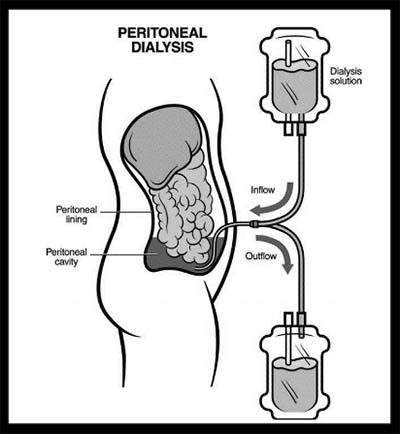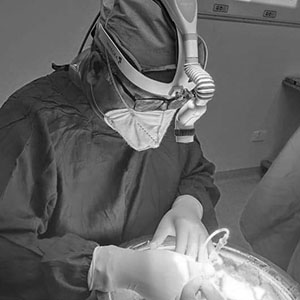How does peritoneal dialysis work?
In peritoneal dialysis, the blood is cleaned inside your body, not outside as with haemodialysis. The inside lining of your own belly acts as a natural filter. You will need a minor operation to place a catheter (soft plastic tube) in your abdomen (belly) for access.
During the treatment, the abdominal area (called the peritoneal cavity) is slowly filled with dialysate (dialysis fluid) through the catheter. The blood stays in the arteries and veins (blood vessels) that line the peritoneal cavity. Extra fluid and waste products are drawn out of the blood and into the dialysate.

Types of peritoneal dialysis
There are two kinds of peritoneal dialysis:
- Continuous Ambulatory Peritoneal Dialysis (CAPD)
- Automated Peritoneal Dialysis (APD)
- Continuous Ambulatory Peritoneal Dialysis (CAPD): This is a “continuous,” machine-free and done while you go about your normal activities such as work or school. You do the treatment by placing about two quarts of cleansing fluid into your belly and later draining it. This is done by hooking up a plastic bag of cleansing fluid to the tube in your belly. Raising the plastic bag to shoulder level causes gravity to pull the fluid into your belly. When empty, the plastic bag is removed and thrown away.
When an exchange (putting in and taking out the fluid) is finished, the fluid (which now has wastes removed from your blood) is drained from your belly and thrown away. This process usually is done three, four or five times in a 24-hour period while you are awake during normal activities. Each exchange takes about 30 to 40 minutes. Some patients like to do their exchanges at mealtimes and at bedtime. - Automated Peritoneal Dialysis (APD): ADP is usually done at home using a special machine called a cycler, which delivers and then drains the cleansing fluid for you. Treatments are usually done at the night while you sleep.
Get An Expert Consultation
* Kidney Transplant
* Robotic Kidney Transplant
* SWAP Kidney Transplant
* ABO Incompatible Transplant
* AV Fistula
* CAPD Cather Insertion
drvarunmittal@yahoo.com

